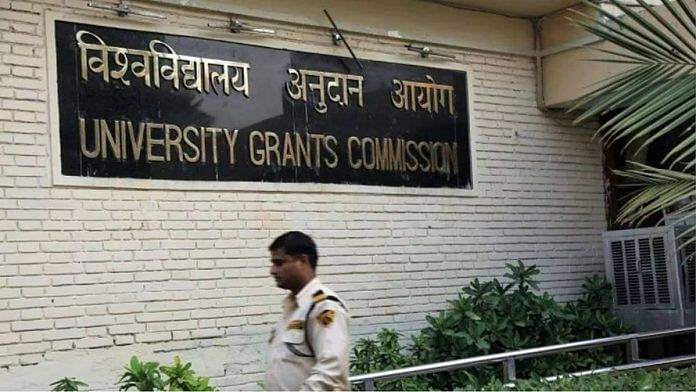New Delhi: The University Grants Commission (UGC) has asked all higher education institutions to permit students to write exams in their mother tongue, even if their medium of instruction was English. The move is meant to promote regional languages.
The letter, written by UGC Chairman M. Jagadesh Kumar, was sent to vice-chancellors of all higher education institutions Wednesday.
Explaining the thought behind the move, the chairman told ThePrint, “The idea behind the move comes from NEP (National Education Policy) 2020, which advocates learning through local/mother tongue. Many students, although studying in English medium, find it difficult to express themselves clearly in English. This provides them an opportunity to write their answers freely.”
The commission has suggested that universities promote translation of educational material to local languages, as well as emphasise the use of local language in the teaching-learning process.
The letter, seen by ThePrint, reads, “It is encouraging to note that the teaching-learning process in local languages is also being promoted by higher education institutions, universities, colleges in every state of the country. This has benefited students, particularly from the socially and economically disadvantaged groups. However, the academic ecosystem generally continues to be English medium centric.”
“Once teaching, learning and assessment are done in the local languages, student engagement will gradually increase, leading to a success rate,” it adds. “This will significantly strengthen the efforts of achieving the envisioned target of enhancing the GER (Gross Enrolment Ratio) in higher education from 27 per cent to 50 per cent by 2035.”
The NEP 2020 encourages ‘mother tongue education’ in schools until Class 5 — and beyond, where possible — and also includes steps to develop resources for multilingual curricula, learning resources and teacher training in local and regional languages.
Also Read: Fudged CV, plagiarism — accusations haunt Kanpur University V-C now under CBI probe
Translation of textbooks in local languages
The higher education regulator has also asked institutions to share some information with it in order to facilitate the arrangement of textbooks in local/regional languages.
This includes a list of textbooks/reference books/study material available or used in the local languages in the institution or university, list of the main topics/courses for which textbooks/reference books/study material must be written or translated into local languages, and information regarding the availability of faculty/subject experts/scholars who can write or translate textbooks/reference books/study materials in local languages in these institutions.
It has also asked institutions to share information on the availability of local publishers for printing textbooks in local languages, success stories if any with regard to bringing out study material in local languages, and whether the students have the ability to write answers in local languages in exams.
“UGC is also working on translating English textbooks in all non-technical disciplines into Indian languages so that students can read these books when they find it difficult to understand from an English textbook,” Kumar said.
(Edited by Geethalakshmi Ramanathan)



